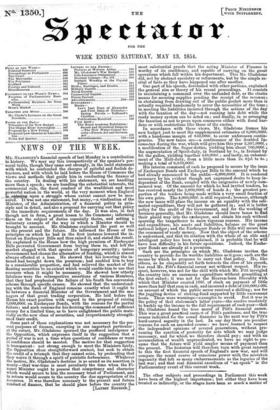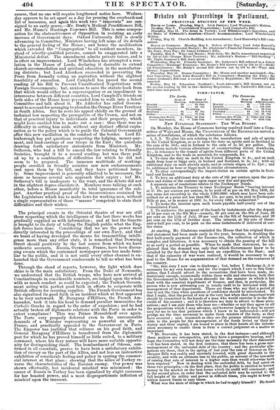The other subjects and proceedings in Parliament this week have
been of the highest importance ; but either they have been treated so indirectly, or the stages have been so much a matter of
course, that no one will require lengthened notice here. Wednes- day appears to be set apart' as a day for pruning the overburdened list of measures, and again this week two " innocents' are con-
signed to an early grave,—Mr. Brady's Medical Practitioners Bin, and Mr. Hume's Hustings Expenses Bill. This is some compen- sation for the obstructiveness of Opposition in resisting an early increase of Government days. Oxford University Bill is slowly advancing in Committee, Ministers having left some of its details to the general feeling of the House ; and hence the modification which extended the " Congregation" to all resident members, in- stead of seleetly-qualified persons, cannot be exaggerated into a Ministerial defeat. The amendment admits private tutors, and is in effect an improvement. Lord Winehelsea has attempted a reso- lution in the House of Lords, declaring it desirable to extend church-accommodation and spiritual education in the manufactur- ing districts ; but Lord Aberdeen succeeded in preventing the Peers from formally voting an aspiration without the slightest feasibility of execution. Lord Campbell has passed the second reading of his Bill to Prevent Unauthorized Negotiations with Foreign Governments ; but, anxious to save the statute-book from that which would either be a supererogation or an impediment to intercourse between different countries, Lord Campbell's friends on both sides of the House have persuaded him to walk into a Select Committee and talk about it. Mr. Adderley has called Govern- ment to account for arranging to abandon the Orange River Territory
in South Africa. But he rests his appeal chiefly on the ground of
technical law respecting the prerogative of the Crown, and not on that of practical injury to individuals and their property, which might have enabled him to make out a case : thus there was no difficulty in setting him aside without any distinct official expla- nation as to the policy which is to guide the Colonial Government after this new vacillation in the conduct of the border. Lord El- lenborough has put questions respecting the lodging, money-pay- ment, and land-carriage of our troops in the East ; the questions
drawing forth satisfactory statements from Ministers. Mr. Sotheron, who had a bill to amend the law relating to Friendly Societies, brought it to a second reading, but was there pull
ed up by a combination of difficulties for which he did not seem to be prepared. The immense multitude of working- people enrolled in friendly societies saw new embarrassments cast upon them by the bill, and they have petitioned large- ly. Some improvement is generally admitted to be necessary, the more so because several acts approach their expiry ; but Mr. Sotheron's bill is inadequate to the want, and the debate did not in the slightest degree elucidate it. Members were talking at each other, before a House manifestly in total ignorance of the sub- ject. Another practical proof of the inconvenience sustained by the Legislature which has to make laws for working men, without a single representative of those " masses " competent to state their difficulties and their wishes.



































